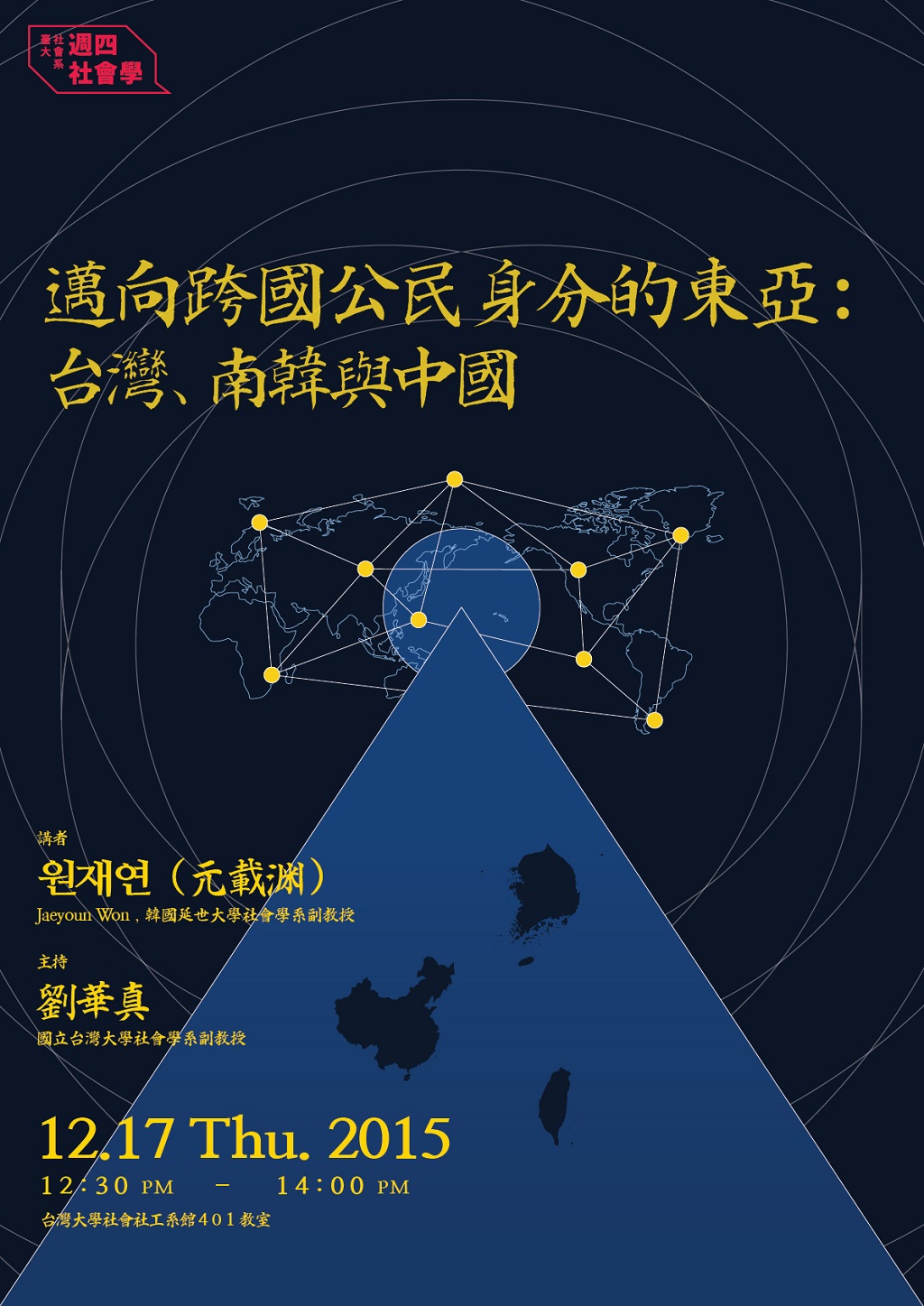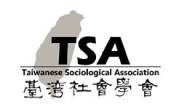學術演講-邁向跨國公民身分的東亞:台灣、南韓與中國(元载渊 Jaeyoun Won 副教授)
2015-12-08
學術演講
講題:邁向跨國公民身分的東亞:台灣、南韓與中國
講者:원재연(元载渊Jaeyoun Won,韓國延世大學社會學系副教授)
主持:劉華真(國立台灣大學社會學系副教授)
時間:12/17(四) 12:30-14:00
地點:社會系館R401
這場演講從台灣、南韓與中國1990年代以來的大尺度社會轉型,探索概念化東亞公民身份議題的新方式。大尺度的社會轉型包括台灣的後威權、中國的後社會主義和南韓的新自由主義,三者彼此關聯,而南韓的華僑在此跨國連結扮演要角。南韓的公民身份採屬人主義,南韓華僑縱使生於南韓,還是持台灣護照、歸為華人族群。他們的跨國多元性(transnational multiplicity)包括原籍山東省、在南韓落地生根且擁有台灣人身分(membership),這種複雜的三歧公民身份跨越單一民族國家的界線。他們原本在出生地經歷了排除和邊緣化過程而成為異鄉人,但情況卻在1990年代以後,因為三地的大尺度社會轉型而改變。首先,台灣獨立的認同萌發,讓缺乏「台灣真實感」(authenticity as Taiwanese)的他們無法再視台灣為避風港。其次,中國的改革開放與隨之而來的中韓外交關係正常化,開啟了連結中韓的新契機。第三,南韓政府在1997年IMF財政危機後開始鬆綁針對他們的牢固、歧視政策。三國的大尺度社會變遷是William Sewell Jr所謂的社會互聯文化「事件」(socially interconnected cultural “events”),挑戰舊的冷戰公民身份概念。這場演講談論那些轉型,並主張從大尺度社會事件的跨國脈絡來理解公民身分。
Toward Transnational Citizenship in East Asia: Taiwan, South Korea and China
This talk explores an alternative way of conceputalizing the issue of citizenship in East Asia, base upon the large scale social transformation since 1990's - post- authoritarian transformation in Taiwan, post-socialist transformation in China, and neo-liberalization in South Korea. These large social events linked with one another, and the case of overseas Chinese in South Korea entails this transnational inter-connection in East Asia. Citizenship in South Korea is blood-based by descent, and overseas Chinese in South Korea hold Taiwanese passports with Chinese ethnicity though they wer born in South Korea. Their transnational multiplicity includes Shandong province as origin, South Korea as settlement and then birthplace, and Taiwanese for their membership. It is a very complex trifurcating citizenship which goes beyond the boundary of one single nation-state. They have become "strangers" in their own birthplace and have gone through the process of exclusion and marginalization. However, from 1990s, there have been some changes. First, Taiwan went through the major changes - it has brought the rise of independent Taiwanese identity. For overseas Chinese in South Korea, this means that Taiwan stops being a safe heaven for them since they lack "authenticity" as Taiwanse. Second, the opening up and the reform of PRC, and following normalization of the diplomatic relations with South Korea had opened new opportunities for them to be a bridge between PRC and South Korea. Third, the South Korean government initiated the relaxation of their rigid, discriminatory policies against them after 1997 IMF financial crises. These large scale social transformation in each country are socially interconnected cultural "events" in William Sewell Jr's sense, challenging the old notion of cold war citizenship. This talks discusses these transformations, and argues that citizenship should be understood in the transnational context of the large scale social "events."
****前三十位入場聽眾,可領取精美餐盒一份,敬請準時入座!
活動網誌:https://goo.gl/GK5tWD

講題:邁向跨國公民身分的東亞:台灣、南韓與中國
講者:원재연(元载渊Jaeyoun Won,韓國延世大學社會學系副教授)
主持:劉華真(國立台灣大學社會學系副教授)
時間:12/17(四) 12:30-14:00
地點:社會系館R401
這場演講從台灣、南韓與中國1990年代以來的大尺度社會轉型,探索概念化東亞公民身份議題的新方式。大尺度的社會轉型包括台灣的後威權、中國的後社會主義和南韓的新自由主義,三者彼此關聯,而南韓的華僑在此跨國連結扮演要角。南韓的公民身份採屬人主義,南韓華僑縱使生於南韓,還是持台灣護照、歸為華人族群。他們的跨國多元性(transnational multiplicity)包括原籍山東省、在南韓落地生根且擁有台灣人身分(membership),這種複雜的三歧公民身份跨越單一民族國家的界線。他們原本在出生地經歷了排除和邊緣化過程而成為異鄉人,但情況卻在1990年代以後,因為三地的大尺度社會轉型而改變。首先,台灣獨立的認同萌發,讓缺乏「台灣真實感」(authenticity as Taiwanese)的他們無法再視台灣為避風港。其次,中國的改革開放與隨之而來的中韓外交關係正常化,開啟了連結中韓的新契機。第三,南韓政府在1997年IMF財政危機後開始鬆綁針對他們的牢固、歧視政策。三國的大尺度社會變遷是William Sewell Jr所謂的社會互聯文化「事件」(socially interconnected cultural “events”),挑戰舊的冷戰公民身份概念。這場演講談論那些轉型,並主張從大尺度社會事件的跨國脈絡來理解公民身分。
Toward Transnational Citizenship in East Asia: Taiwan, South Korea and China
This talk explores an alternative way of conceputalizing the issue of citizenship in East Asia, base upon the large scale social transformation since 1990's - post- authoritarian transformation in Taiwan, post-socialist transformation in China, and neo-liberalization in South Korea. These large social events linked with one another, and the case of overseas Chinese in South Korea entails this transnational inter-connection in East Asia. Citizenship in South Korea is blood-based by descent, and overseas Chinese in South Korea hold Taiwanese passports with Chinese ethnicity though they wer born in South Korea. Their transnational multiplicity includes Shandong province as origin, South Korea as settlement and then birthplace, and Taiwanese for their membership. It is a very complex trifurcating citizenship which goes beyond the boundary of one single nation-state. They have become "strangers" in their own birthplace and have gone through the process of exclusion and marginalization. However, from 1990s, there have been some changes. First, Taiwan went through the major changes - it has brought the rise of independent Taiwanese identity. For overseas Chinese in South Korea, this means that Taiwan stops being a safe heaven for them since they lack "authenticity" as Taiwanse. Second, the opening up and the reform of PRC, and following normalization of the diplomatic relations with South Korea had opened new opportunities for them to be a bridge between PRC and South Korea. Third, the South Korean government initiated the relaxation of their rigid, discriminatory policies against them after 1997 IMF financial crises. These large scale social transformation in each country are socially interconnected cultural "events" in William Sewell Jr's sense, challenging the old notion of cold war citizenship. This talks discusses these transformations, and argues that citizenship should be understood in the transnational context of the large scale social "events."
****前三十位入場聽眾,可領取精美餐盒一份,敬請準時入座!
活動網誌:https://goo.gl/GK5tWD




